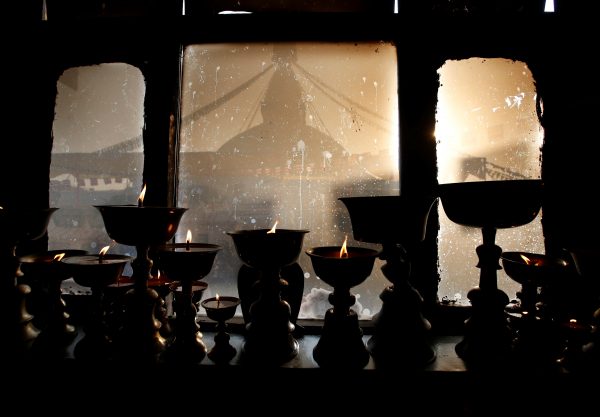It continued to struggle with a flawed constitution, government incompetence and a sluggish economy throughout 2016.
Although Nepal’s people demonstrated exemplary solidarity directly after the 2015 earthquake the country did not rebuild and reconstruct with the same vigour. Politics dominated the donation collection effort, and the newly created Nepal Reconstruction Authority became a political tool to control the US$4 billion committed by donors.
The Nepalese people had so little faith in the government’s reconstruction process that in many cases they decided to take on the rebuilding themselves. For example, the Boudhanath Stupa restoration took place without any government contribution, yet Prime Minister Pushpa Kamal Dahal happily inaugurated the new structure. Meanwhile many other historic sites that were damaged by the earthquake are yet to have named their reconstruction committee members.
The government also failed to provide respite for people pushed into poverty by the earthquake and stricken further by the blockade. Nepal missed an opportunity to show the world that they could deliver like they did during the relief phase directly after the earthquake.
In 2016 Nepal’s already fragile democracy grew weaker. In Nepal, there is no real opposition as the opposition parties of today become part of the government formation tomorrow. Governments decide on their (short) term length far in advance and see their time in power as an opportunity to provide benefits to their inner circle. And the promised constitution amendment bill is still yet to pass the parliament.
In 2016 the Commission for the Investigation for Abuse of Authority, Nepal’s apex anti-corruption body, emerged as a force to reckon with. Its chief now faces an impeachment motion in the parliament after much uproar over his methods, but the politicians in parliament are keeping the motion on the back burner as they can also see the upsides of such a body that they have used and abused to harm their opponents.
Nepal’s private sector is even more dominated by business cartels at the end of 2016. Lawmaking has now fallen into the control of a few parliamentarians who own businesses. A more inward-looking policy framework is also emerging in Nepal, increasingly isolating itself from a world that is growing more connected.
Consumers suffered from profiteering businesses. The absence of opportunities and banks wanting to make more money pushed liquidity to the stock market converting the stock market into a gambling den where no global parameters of risk versus returns work. Nepalis bought into stocks that were rated poorly or were grossly overvalued. Regulators did not want to intervene as the political–business nexus became more entrenched within the stock market.
The international donors that provided assistance to Nepal after the earthquake in 2015 were happy limiting their activities to short-term initiatives, like declaring no-defecation zones, sub-contracting work to for-profit development firms and undertaking short-term projects. Given Nepal’s political uncertainty and the inward-looking private sector, they could not focus on longer-term plans.
Nepal is at a political and economic low point. If this continues through 2017 Nepal’s people might seek to leave the country for greener pastures, which many have done already. Nepal can only hope that 2017 bucks the trend and proves this wrong.
Sujeev Shakya is Chair of the Nepal Economic Forum.
This article is part of an EAF special feature series on 2016 in review and the year ahead.

